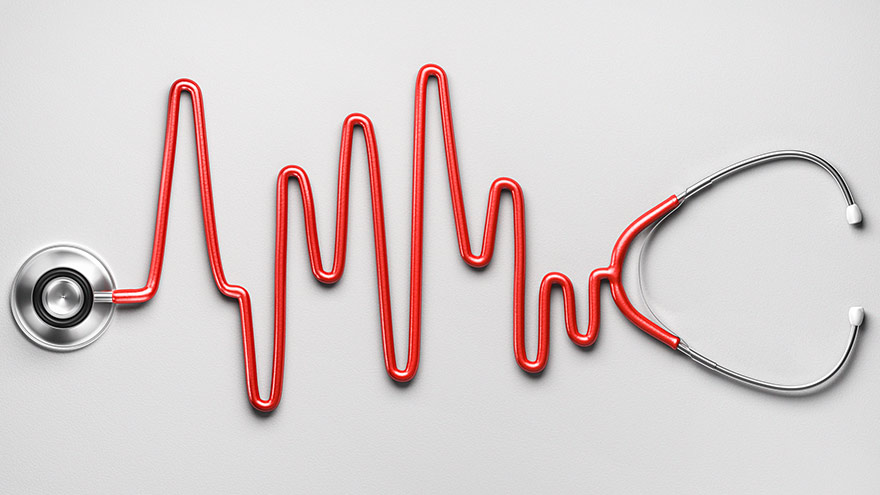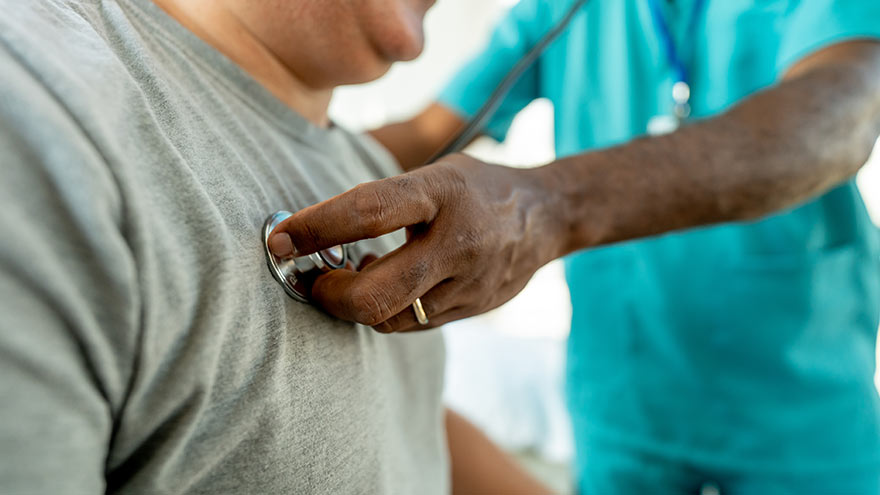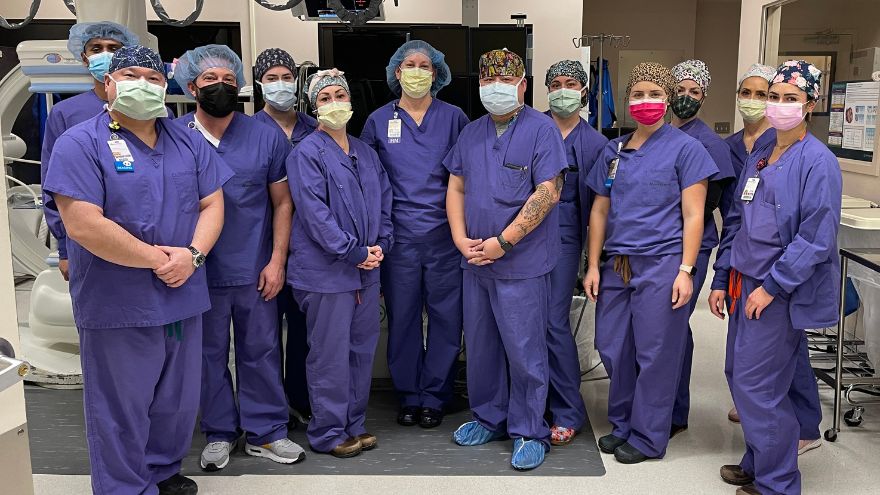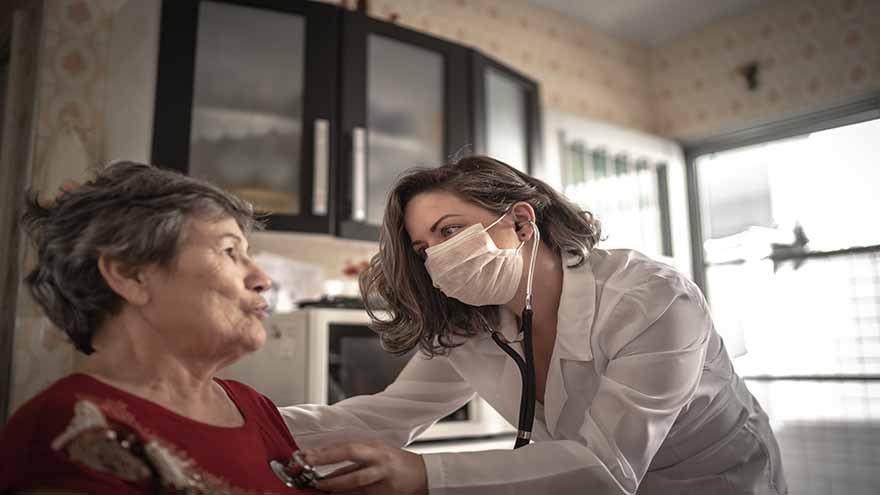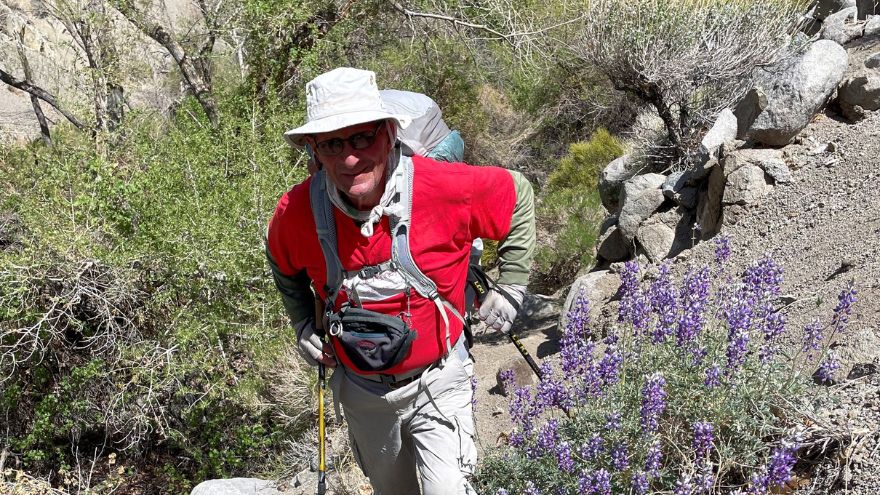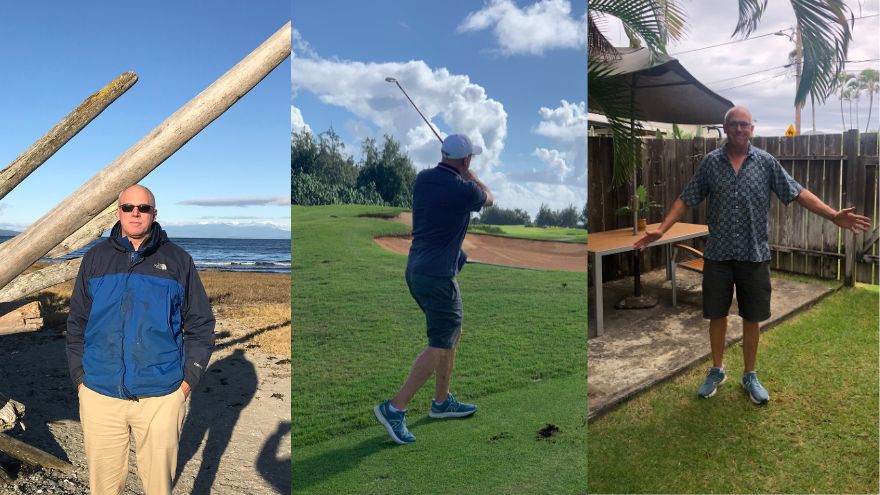Search
-
Foods to Avoid When Taking Heart Medications
Did you know certain medications can interact with everyday food and drink? We asked VP of Pharmacy Services Adam Porath how to take these important medications safely. One in five Americans between the ages of 40 and 75 are currently taking a statin drug to reduce their cholesterol level or to prevent atherosclerosis (hardening of the arteries). Many others also take anticoagulants (blood thinners) to prevent blood clots from forming, which can increase the risk of stroke. Adam Porath, VP of Pharmacy Services at Renown Health, explains how to safely take these medications. What is a statin? A statin is a drug that can lower cholesterol by helping your body absorb cholesterol or by blocking a substance your body needs to make it. The American Heart Association cites a global study reporting the benefit of statins to help reduce heart attacks and strokes. Common statins include atorvastatin (Lipitor), pravastatin (Pravachol), rosuvastatin (Crestor) and simvastatin (Zocor). Which foods or drinks should be avoided while taking statin drugs? Grapefruit juice is the only food or drink that has a direct interaction with statins. Statins do not directly interact with any food but people taking statins should moderate their intake of saturated fats to help lower their LDL cholesterol and overall risk of cardiovascular disease. What is a blood thinning drug? Blood thinning drugs, such as warfarin, rivaroxaban (Xarelto), apixiban (Eliquis), dabigatran (Pradaxa) and edoxaban (Savaysa), are used to prevent stroke. Which foods or drugs should be avoided while taking blood thinning drugs? If taking warfarin, alcohol and cranberries (including juice) should be avoided. Patients taking warfarin should be aware of foods that contain Vitamin K (green leafy vegetables) and try to maintain a consistent diet of these foods. Warfarin interacts with many over the counter and prescription medications. Patients should consult a pharmacist when starting, stopping, or changing doses of any medication when taking warfarin. Also, patients taking any blood thinning medication should avoid over-the-counter pain relievers (i.e. aspirin, ibuprofen, etc.) How do I know whether to take my medication with food or not? Consulting with a pharmacist is the best resource to determine if a medication should be taken with or without food. In general, all statins and blood thinners can be taken with or without food. The only exception is Xarelto (rivaroxaban), which should be taken with the largest meal of the day If you are a Renown patient you can also review your prescriptions online, request a refill or ask a question via MyChart. With MyChart, you can access all your healthcare information securely 24/7.
Read More About Foods to Avoid When Taking Heart Medications
-
Trends in Cardiovascular Medicine Conference
Heart disease continues to be the leading cause of death in America and doctors face many challenges treating this and associated heart and vascular conditions. Renown is hosting a three-day conference to discuss the latest in cardiac care. Trends in Cardiovascular Medicine Doctors and healthcare providers across the region are gathering for the 33rd Annual Trends in Cardiovascular Medicine Conference Nov. 3rd – 5th at the Everline Resort & Spa in Olympic Valley, California, hosted by Renown Institute for Heart & Vascular Health and the Nevada Academy of Family Physicians. The three-day conference educates primary care providers, nurses and all other physicians and healthcare personnel interested in the most recent advances and current established guidelines for the diagnosis, treatment and prevention of cardiovascular disease, diabetes mellitus, stroke and diseases or problems associated with heart disease. It is also a chance for medical providers to ask first-hand questions on a variety of trending topics ranging from the practical evaluation and management of obesity to interpreting echocardiograms in primary care. The conference objectives include: Identifying clinical clues suggesting a diagnosis of cardiac amyloidosis. Gaining a better understanding why the differential diagnosis and patient history is key to evaluating patients with syncope. Assessing the accuracy and effectiveness of various tests and tools used in atrial fibrillation screening. Determining the appropriate diagnosis of pulmonary hypertension. Describing the evolving lipid management landscape. For a complete conference schedule, more information or to register for this conference, visit: renown.org/trends.
Read More About Trends in Cardiovascular Medicine Conference
-
6 Signs of Heart Failure
Heart failure is a serious medical condition that occurs when the heart is unable to pump blood effectively, leading to a variety of symptoms and potential complications. Although there has been progress made in the treatment of many forms of heart disease, heart failure continues to be a prevalent and life-threatening condition – nearly 6.2. million adults in the U.S. have heart failure. Recognizing the signs of heart failure is crucial for early detection and timely intervention. We talked to Ruth Skinner, APRN at the Renown Institute for Heart & Vascular Health, about recognizing common signs and symptoms of heart failure. Heart Failure Signs and Symptoms The symptoms of heart failure may be subtle and can be mistaken for normal signs of aging. Common symptoms of heart failure are due to extra fluid or congestion – typically starting with congestion of the lungs, then moving to different parts of the body. Common heart failure symptoms include: Breathing Difficulties (Dyspnea): One of the hallmark symptoms of heart failure is shortness of breath during daily activities and having trouble breathing when lying down. Fatigue and Weakness: Because heart failure can lead to reduced blood flow to the body’s tissue, patients may find themselves becoming tired and weak even during routine activities. Swelling (Edema): Fluid retention in the body can cause noticeable swelling. Weight gain along with swelling of the feet, legs, ankles or stomach is often a key sign of worsening heart failure. Rapid or Irregular Heartbeat: Heart failure can disrupt the heart's electrical signals, causing irregular heartbeats (arrhythmias) or a rapid heartbeat (tachycardia). These can be felt as palpitations or fluttering sensations in the chest. Persistent Cough or Wheezing: Fluid buildup in the lungs triggers a persistent cough, sometimes accompanied by pink or white mucus. Loss of Appetite or Nausea: Heart failure can affect blood flow to the digestive system, leading to symptoms like loss of appetite and nausea. If you or a loved one experiences any of the above signs and symptoms, it’s important to seek medical attention promptly.
-
Managing Your Uncontrolled High Blood Pressure
Renown Health, the region's leading cardiology care provider, is offering a clinical trial for eligible patients struggling to control their high blood pressure. Nearly half of adults (119.9 million) in the United States have hypertension, or blood pressure that is higher than normal. Hypertension can put you at risk of other life-threatening disease, such as a heart attack or stroke. There are methods that cardiologists use to manage high blood pressure, but only 1 in 4 adults with hypertension (27.0 million) have their blood pressure under control.* Some patients with high blood pressure experience resistant hypertension, which does not respond well to multiple antihypertensive medications given at the same time. This means that there are many important opportunities for healthcare professionals to explore new ways to treat hypertension. At Renown Health, we lead the region in cardiology care with our technological expertise and patient-centered approach. That is why our cardiology team is partnering with the Renown Research Office to offer the RADIANCE Continued Access Protocol (RADIENCE CAP) clinical trial to eligible patients. RADIANCE CAP is a non-randomized study designed to allow for continued access to ultrasound renal denervation therapy via the Paradise System, and to allow for the on-going collection of safety and effectiveness data in patients with uncontrolled hypertension despite the prescription of antihypertensive medications. The body’s complex communication system between the brain, heart and kidneys can sometimes become overactive, increasing your blood pressure through messages in the nervous system. Renal denervation is a minimally-invasive procedure which reduces activity from the nerves in your kidneys to lower blood pressure. This is the third in a series of renal denervation clinical trials Renown Health has offered to patients with resistant hypertension over the last several years, with over 40 local participants. “All the participants that I have had the pleasure to work with on these studies are very excited and grateful to have this option for helping control their blood pressure” states Lisa English, Lead Clinical Research Coordinator for Cardiology studies at Renown Health. “I love getting to know each one of them and helping on their healthcare journey. We have an amazing team of providers and staff at Renown that go out of their way to make patients experiences positive and the studies successful.” Dr. Michael Bloch, Cardiologist and Principal Investigator for the RADIANCE CAP study at Renown Health’s Institute for Heart and Vascular Health adds, “Despite lifestyle modifications like diet and exercise and the widespread availability of effective and well-tolerated medications, approximately 50% of all people with hypertension have inadequate blood pressure control putting them at risk for stroke, heart failure and kidney disease. As a one-time durable procedure, renal denervation with the Paradise endovascular system from ReCor Medical, Inc. may help millions of patients improve their blood pressure control without necessarily needing to increase their medications.” Our teams of expert providers and researchers are here to support you on your healthcare journey. Talk to your provider about the RADIANCE CAP clinical trial at your next appointment to see if participation may be right for you.
Read More About Managing Your Uncontrolled High Blood Pressure
-
What Is an Echo-Tech?
When it comes to our heart, keeping this vital source of life in tip-top shape is of utmost importance. Echo technologists or echocardiographers, otherwise known as "echo-techs," are charged with that mission, providing critical information that leads to life-saving interventions to keep our hearts beating strong. Adrianne Little, echocardiographer at Renown Health, breaks down the echo-tech's role in the health system, the educational path it takes to get there and the unique perks that come with the profession. What does an echo tech do? “Echo techs play a key role in the diagnosis and treatment of patients,” said Adrianne. “We are members of the cardiovascular imaging team that perform ‘heart ultrasounds’ or echocardiograms. Although we are most commonly known as echo techs, our official title is either ‘cardiac sonographer’ or ‘echocardiographer.’” Echo techs use imaging technology and sophisticated ultrasound equipment to produce images of the heart. These images show how well the heart functions, as well as the valves, chambers and blood flow. Echocardiograms are used to diagnosis and treat a variety of heart conditions such as murmurs, arrhythmias and heart failure. At the end of the day, the main goal of echo techs is to help our cardiovascular team provide the quickest and most accurate diagnoses to help with patient management and help them receive the highest standard of care. “When it comes to looking at the heart, we are part of the front-line team," said Adrianne. “We provide real time critical information that leads to life saving interventions down the road.”
-
Department Spotlight Cardiac: Catheterization Lab
February is American Heart Month, but our incredible heart heroes are here to serve you all year long. So please join us in honoring the Cardiac Cath Lab team at Renown Health! At the core of who we all are, we find the heart: one of the largest sources of life that gives us the blood and oxygen we need to live full and healthy lives. When the heart doesn’t function to the best of its ability, a delicate approach led by cardiac experts might be necessary. These individuals can not only save lives but also help facilitate a higher quality of life. The team entrusted to protect that vital source of life includes the hard-working and talented individuals in the Cardiac Catheterization Lab (a.k.a. “Cardiac Cath Lab” or “Cath Lab”) at Renown Health. These team members are known for their expertise, precision and quick-thinking in emergencies. When it comes to the function of your heart, you are in the best hands with this team. Their passion for Renown’s mission of making a genuine difference in the health and well-being of the people they serve is a testament to what they do every day. Cardiac Champions Whether the procedure is emergent or planned, the Cardiac Cath Lab wears many different hats. The team is a well-coordinated group of nurses, imaging professionals, electrophysiology technologists, interventional technologists and more who band together to provide a diverse array of services, including stent placements, pacemakers, balloon pumps, interventional angioplasties, TAVRs and of course, catheters. “A day in the life in the Cath Lab can go various ways,” said Erica Drummer, RN at Renown Health. “Every day, you are either a part of the electrophysiology team, doing cardiac ablations and placing devises such as pacemakers; the structural heart team, which includes MitraClips for mitral regurgitation and TAVRs; or the heart catheterization team, which includes diagnostic angiograms, heart catheterizations, angioplasties and stents for clogged arteries.” With the wide variety of cases the team sees daily, an average day in the Cath Lab consists of many moving parts. “We handle cases from left and right heart catheterizations, where we can diagnose and fix the artery right then, to electrophysiology cases like heart ablations and pacemaker implants, all the way to emergency STEMI (heart attack) patients,” said Michael Blankenship, Electrophysiology Technologist at Renown Health. “We do so many things in the Cath Lab,” added Laurel Douglas, RN, Imaging Manager at Renown Health. “We ensure we have 24/7 coverage for emergencies, as we often have to act at a moment’s notice to care for emergent situations.” Many of those emergency situations involve heart catheterization. If someone has a heart attack, the team immediately steps in to place stents to open the coronary arteries that are causing the attack. If a patient’s heart needs any assistance during an emergency, the team can place devices such as Impella (temporary ventricular support) or intra-aortic balloon pumps. Renown is a major advocate for advanced medical technology, and the Cardiac Cath Lab team embraces these technologies to perform life-saving procedures, all while working together as a cohesive unit. “We work amongst each other to ensure sterility, safety and the best outcome for each patient,” said Zohra Benbrahim, RN at Renown Health. “We try to fit in as many cases as possible into the workday, and sometimes after hours, so patients can get the care they need.” “Each team usually has 3-4 members, and each member has a critical job to carry out in order to implement excellent cardiac care,” added Erica Drummer, RN. “Many of our patients tell us that we all work well together, and I couldn’t agree more. We have become like a well-oiled machine or a NASCAR pit crew.” Naturally, patients undergoing any heart procedure might feel frightened and anxious. Never fear – the compassionate Cardiac Cath Lab team is here to ease those fears throughout each patient’s entire visit. Their main solution? Communication. “Being a patient in the Cath Lab can be daunting,” said Erica Drummer, RN. “When we have patients who may feel scared or have concerns, we try our best to connect with them, keep them informed and educate them on the procedure and the step-by-step process, including what they may feel before, during and after.” “Overall, we try to keep spirits light,” said Zohra Benbrahim, RN. “Our team is excellent at explaining the procedure as it is happening. We also advocate for comfort throughout the procedure, which helps tremendously with anxiety, including giving patients warm blankets and music of their choice!” Our experts in the cardiac Cath Lab make sure that no stone goes unturned when it comes to optimal heart function for every patient. Together, the team mends hearts and saves lives, day in, day out. A Growth Mindset Always learning, always improving, always reaching new heights – that's the Cardiac Cath Lab team. This team’s accomplishments speak for themselves on both a local and national scale. “Over the years, we have achieved several milestones, including becoming a STEMI Receiving Center, gaining our Chest Pain Center Accreditation (which is achieved by Cath Labs who provide emergent percutaneous coronary intervention for heart attack patients 24/7) and having our accredited electrophysiology program,” said Laurel Douglas, RN. “We also offer services that other facilities do not offer. We have brought in several new procedures to the Cath Lab over the years. This is impactful, as the community members get to stay here for treatment.” The Cath Lab team is anything but ordinary. There is never a dull moment in this department, and despite an ever-growing caseload, the team is always ready to rise to the challenge and continue pushing to surpass the average. “I am so proud of my team for providing care for such sick patients,” said Zohra Benbrahim, RN. “We never really know how the day is going to go because emergencies happen, and things always change. Recently, we had a record high volume of cases, and my team powered through these busy weeks like champs.” “We strive to get our STEMI door-to-balloon times at or below 60 minutes,” added Erica Drummer, RN. “Door-to-balloon time refers to the time from when a patient arrives in the ER to the time the Cath Lab has a catheter guide wire crossing the culprit lesion in the coronary artery that is causing the heart attack. The national average (and current guideline) is 90 minutes, so our 60-minute time is a notable accomplishment for us.” The importance of staying on top of your heart health comes center stage during American Heart Month, which is a prime opportunity for our cardiology professionals to educate the community and help them grow their cardiac knowledge. The cardiac quality team participates in community events throughout the month (and beyond!) to raise awareness for cardiac health. The team also outreaches to other health systems and healthcare partners to highlight what Renown has to offer in the way of heart care. Each Cath Lab team member always reminds patients about lifestyle choices and diet changes that can improve cardiovascular health, and they take this outreach with them all around Renown Regional Medical Center as well, walking through the hallways promoting many different ways of living a heart-healthy life. The journey continues! The team will soon welcome a new Cardiac Cath Lab at Renown South Meadows Medical Center. The new lab will allow our experts in heart care to treat patients at our South Meadows location experiencing a heart attack and needing immediate intervention to open vessels in their hearts. The team is looking forward to embracing even more access to emergent cardiac care for our community at large. Learn more about how Renown is building more ways to care for our community. Now Hiring for Heart Heroes Those looking to join a caring, committed and tight-knit group of cardiac care professionals will be in good company with the Cath Lab team. According to the members of this department, being a quick-thinking, dependable team member is key to predicting a successful Cath Lab professional. “A good coworker communicates with everyone and is able to be flexible when things get hectic,” said Zohra Benbrahim, RN. “Our team stays so close with each other because of everyone’s ability to recognize where help is needed. Especially in the Cath Lab, it is important to be always aware of the patient’s vitals and clinical presentation so you can speak up if you notice changes. There are always new procedures or products coming out that become integrated into our practices, so it’s also good to welcome new policies and be adaptive.” “We are a small team, and everyone sees each other as a friend,” added Laurel Douglas, RN. “We all know we will need help at some point, whether it be covering an on-call shift or helping during a procedure, so we all help each other. Teamwork and positive attitude are really what makes you a good team member.” Not only are these individuals dedicated to impacting the lives of patients with the very organ that beats life into them, but they also are devoted to Renown – and it shows. “I started working for Renown when I was 19 years old, and Renown was the medical system I went to for care; as I spent more time working here and becoming a part of the community, I could not see myself working anywhere else or getting care at any other hospital,” said Zohra Benbrahim, RN. “I truly believe Renown provides the best care and best serves the growing community of northern Nevada.” The Cath Lab team members agree that Renown is a great place to both start and continue your career. Many of them have taken advantage of Renown’s training and educational opportunities, which in turn have helped them expand their knowledge to better serve the community. “I chose to work at Renown because it gave me the place to grow in my career and experience different avenues within my career,” said Michael Blankenship. “I first started off as a student here, and I quickly realized that everybody I worked with genuinely cares for our patients. I started off in x-ray seeing patients and eventually did rotations up in the operating room, and I got hired full time in the Cath Lab. After a short time being here, I was crossed trained in the electrophysiology lab, where I furthered my knowledge in my career.” This dynamic department is actively hiring, and many open positions are sign-on bonus eligible. The team cannot wait to welcome you to their, as Erica Drummer puts it, “well-oiled machine.” “Being a Cath Lab nurse is very rewarding, especially when you’re able to be a part of a team that can save someone’s life,” Erica closes.
Read More About Department Spotlight Cardiac: Catheterization Lab
-
Getting to the HEART of Research
In February, we think about hearts not just in honor of Valentine’s Day but because it is American Heart Association Month. This is a great reminder to focus on our personal cardiovascular health. Renown Health helps patients think about their heart health with our world-class providers and cutting-edge treatments through our Cardiovascular Clinical Trials. “Research serves a vital role in the future care of cardiovascular diseases. Being involved in research will help our medical community to further discover new treatment plans in our quest for life preservation and extension,” Dr. Thomas To, Cardiologist and Researcher at Renown Health. For example, let’s talk about atherosclerosis. When our hearts are healthy, they are a strong muscle that pumps our oxygen-rich blood through our coronary arteries. Over time, cholesterol and fats can build up in our arteries. This is a condition known as atherosclerosis. This type of plaque buildup in the arteries can lead to a heart attack or stroke if not properly managed. If you are experiencing chest pain or discomfort, shortness of breath or pain in areas of the upper body, these can be the warning signs of a heart attack, and you should call 911. One contributing factor to atherosclerosis is elevated lipoprotein(a) levels and the accumulation of cholesterol in the arteries, which increases the likelihood of a heart attack or stroke. Lipoprotein(a) is tested separately from the standard panel that is completed for cholesterol management, and while your total cholesterol levels may be in a healthy range, lipoprotein(a) levels can still be elevated. "Increasingly we are realizing that lipoprotein(a) levels can be used as an important assessment in more carefully delineating an individual's risk of future cardiovascular events and treatment targets" said Dr. Michael Bloch, Lipid Specialist and Researcher at Renown Institute for Heart and Vascular Health. While it is clear that elevated lipoprotein(a) contributes to atherosclerosis, there are currently no approved medications for reducing cardiovascular disease risk through reducing lipoprotein(a) levels. This is why Renown Health’s Research Office is proud to offer a phase III clinical trial, called the OCEAN(a) study, to our patients with elevated lipoprotein(a) levels as a care option for management of their heart disease risk. Our teams of expert providers and researchers are here to support you on your healthcare journey. “I am thrilled to be able to be part of this study and bring opportunities like this to our patients. The highlight of my day is getting to hear life stories from my patients during our study visits,” Lisa Preciado, Primary Clinical Research Coordinator for the OCEAN(a) study said. Join us in raising awareness around American Heart Month by talking to your provider about lipoprotein(a) at your next appointment. At Renown Health, our goal is to make it easy for patients to access clinical research as a care opportunity where patients can access a variety of standard care treatment options for their health condition or choose to participate in a clinical trial. For more information about clinical trial opportunities available to you or to ask any questions, contact the Renown Research Office at Renown-CRD@renown.org or 775-982-3646.
-
Your Top 5 Questions about TAVR Answered
Your heart is the muscle in charge of pumping blood to your entire body. This vital organ is made up of chambers, valves and blood vessels. Your heart valves work similarly to a one-way door: they open and close, controlling blood flow in the correct direction through the heart chambers. For patients who have been diagnosed with a heart-related condition like aortic valve stenosis (narrowing), it is important to know treatment options. Most might think open-heart surgery is the only way to treat a heart valve, but many hospitals, including Renown, also offer a minimally invasive procedure called a Transcatheter Aortic Valve Replacement (TAVR). Dr. Abhilash Akinapelli of Renown Institute for Heart & Vascular Health shares his answers to the top five TAVR questions: 1. What causes aortic valve stenosis? Aortic valve stenosis can be caused by a variety of factors. The main reasons being wear and tear of the valve due to aging; genetically abnormal heart valve (bicuspid aortic valve); long-standing high blood pressure; and other reasons like radiation exposure. 2. Am I a candidate for TAVR? Renown’s heart care teams are made up of your primary care provider, cardiologist and cardio thoracic surgeon. They will evaluate if patients are a good candidate for the TAVR procedure by performing a variety of screenings and tests. Some of these include: Echocardiogram Electrocardiogram (ECG or EKG) Chest X-ray Exercise tests or stress tests Cardiac computerized tomography (CT) scan Cardiac catheterization 3. What are the advantages of the TAVR procedure? The Transcatheter Aortic Valve Replacement (TAVR) procedure is much less invasive than open heart surgery, otherwise known as a Surgical Aortic Valve Replacement (SAVR). Patients can typically return to their normal lifestyles within a week after leaving the hospital. During the TAVR procedure, a stent valve mounted on a balloon is advanced to the heart through the blood vessels in the groin without any incision. Once in position, the balloon will be inflated to firmly expand the new valve inside the diseased old valve, pushing it away to the sides. Once the new valve is in place, it begins working immediately and the deflated balloon is removed. The surgical procedure is approximately one hour long. Patients can get up and walk after four hours and will be discharged the following day if no complications arise. Compared to a SAVR, recovery time is much shorter and less risky for patients above the age of 75. A big advantage for anyone who fits under the criteria for a TAVR. 4. Is the procedure painful? The TAVR procedure is not surgery, but you will still be asleep during the procedure. Since no incision is made, it is essentially a painless procedure. Patients may experience slight discomfort such as aches and pains at the entry site of the catheter. 5. Can I have an MRI and X-rays done after having a TAVR valve? Yes, patients can have MRI scans and X-rays after TAVR. For further questions and information about the TAVR procedure, please consult with your Renown heart care team at 775-982-2452 or through MyChart.
-
Staying Heart-Healthy with Genetic Screening
February is American Heart Month. While cardiac care is crucial every time of year – especially as heart disease stays the number one killer in the United States – American Heart Month serves as a great reminder to stay on top of your heart health. We spoke with Malina Ruiz, a cardiology nurse practitioner at Renown Health, on three key ways to embrace heart-healthy living and how genetic screening can help inform you of certain genetic risks that can play a role on the cardiac life stage. 1. Invest in a heart-healthy diet. Eating a diet that is rich in fruits, vegetables, whole grains and healthy fats (including monounsaturated fats such as avocados and polyunsaturated fats such as sunflower oil) is a key defense in protecting your cardiac health, according to Malina. While you are filling your plate with these nutritious foods, remember to keep an eye on your saturated and trans-fat intake, and try limiting foods that are high in those fats. “No matter what age we are, maintaining a heart-healthy diet will always be important,” said Malina. Need help finding cardiac-friendly meals? The National Heart, Lung and Blood Institute makes it easy with heart-healthy recipes and tips from experts. 2. Do an exercise audit. “Keeping an active lifestyle during our younger years is one of the most important factors that affect heart health in future years,” said Malina. Maintaining a regular exercise regimen that allows you to raise your heart rate and break a sweat can help prevent future cardiac events. A good rule of thumb is to aim for 150 minutes a week of moderate-intensity exercise, which averages out to 30 minutes a day on 5 days out of the week. It’s never too late to start a regular exercise routine! Exercise doesn’t have to be something you dread – leverage American Heart Month to find activities that you enjoy. The American Heart Association can help you discover new ways to move your body. At the end of the day, as Malina emphasizes, “any movement is better than nothing!” 3. Don't skip those check-ups. Regular preventative visits with your primary care provider can help you identify possible risk factors for heart conditions before they start actively affecting your life. “Check-ups become even more important as we age, along with being aware of the signs and symptoms of heart disease, heart attack and stroke,” added Malina. There’s no time better than the present – call our expert scheduling team today at 775-982-5000 to request a preventative check-up with your primary care provider.
Read More About Staying Heart-Healthy with Genetic Screening
-
8 Reasons to See a Cardiologist
While February is recognized as American Heart Month, it’s important to prioritize your heart health 365 days a year. Cardiologists play an integral role in our overall health and wellbeing – they are the experts when it comes to preventing and treating heart and vascular diseases. Dr. Jad Al Danaf of Renown Institute for Heart & Vascular Health shares eight reasons to visit a cardiologist. 1. Abnormal EKG The American Heart Association states an electrocardiogram, abbreviated as EKG or ECG, is a recording of the heart’s electrical activity to measure the rate and rhythm of the contractions in the upper and lower chambers of the heart. An EKG detects heart problems or abnormalities. If you have an EKG that shows abnormal results, you’ll want to see a cardiologist. An abnormal EKG can mean many things, such as irregular heart rate, heart rhythm abnormalities in the shape or size of the heart, medication side effects, and more. A cardiologist is most qualified to evaluate an abnormal EKG and determine the cause. 2. Immediate family history of heart disease or sudden cardiac death Knowing your family health history is essential to identify if you’re at risk for certain health conditions such as heart disease. For example, if you’re aware of anyone in your immediate family who had or has had heart problems or passed away from sudden cardiac death. In that case, you’ll want to discuss it with a cardiologist so they can determine if screenings, medications, or lifestyle changes are needed to help lower your risk. 3. Chest pain or shortness of breath with exertion If you have chest pain or shortness of breath that starts or worsens with activity, it may indicate a heart problem, and you should schedule a visit with a cardiologist immediately. Severe chest pain might be a sign of a heart attack or other serious medical emergency. If you’re experiencing severe chest pain, shortness of breath, or any other signs of a heart attack, call 911 immediately. 4. High blood pressure Have you had a high blood pressure reading? If so, it’s recommended to consult with a cardiologist for further evaluation. High blood pressure puts you at risk for heart disease and stroke, as uncontrolled high blood pressure can damage arteries, reducing blood flow and oxygen to your heart and brain.
-
Hiking Through Life After TAVR
Renown Health patient, Alden Nash, hiking Death Valley National Park just three months after a Transcatheter Aortic Valve Replacement. Alden Nash isn’t your average 80-year-old. For much of his life, he could be found outdoors enjoying nature and hiking some of the west coast’s highest elevations. A husband and father of two, Alden turned his passion into a career as a Yellowstone park ranger in 1965. Alden believes his passion for the outdoors is responsible for his many years of health – until the unavoidable happened. The Hardest Climb The number one doctor recommendation for a healthy heart – lead a healthy, active lifestyle. Any cardiologist would be thrilled to have Alden as a patient due to his robust physical activity regimen. “Don’t have a TV set or a lounge chair in your house and you’re all set,” said Alden when asked how he has remained so fit throughout his senior years. Unfortunately, many other factors come into play when it comes to heart health, one of which is the reason we are telling Alden’s story today. Familial history - it’s a hot topic in the world of medicine. Understanding your genetic risk factors can help care providers develop updated care plans based on your results. Alden’s family has a long history of high cholesterol, which he avoided for much of his life by staying active. This combined with his age resulted in his first heart attack in December 2021. Doctors later determined that Alden was suffering from a type of heart valve disease known as aortic valve stenosis. Aortic stenosis is the narrowing of your aortic valve opening that impedes normal blood flow. Over time, the leaflets of your aortic valve become stiff, reducing their ability to fully open and close. When the leaflets don’t fully open, your heart must work harder to push blood through the aortic valve of your body. Eventually, your heart gets weaker, increasing the risk of heart failure. People who are most at risk for aortic stenosis include those who have had certain heart conditions present at birth, have chronic kidney disease or have heart disease risk factors such as high cholesterol and high blood pressure. However, generally, aortic stenosis is a degenerative process of aging with no modifiable risk factors. The incidence of aortic stenosis increases rapidly with age and is very common above the age of 80 – with 1/10 having the condition and 1/50 with a problem severe enough to warrant surgery. When symptoms are present, the disease can be rapidly disabling or even deadly, often progressing over several months unless treated.
-
Excellence in Heart Care Changes a Patient's Life
Being diagnosed with a chronic heart condition like atrial fibrillation (A-fib) can shift the course of your entire life. Embracing heart medications and lifestyle changes become your norm, and thanks to advancements in medicine and medical technology, managing the condition can bring you to a new sense of normalcy. But what if a different option was possible – one that would make medications and activity limits a thing of the past? This became the reality for Renown Health patient Richard Preyer after receiving a hybrid catheter ablation. Thanks to the vigilant surgical care of Shining Sun, MD, a cardiologist at the Renown Institute for Heart & Vascular Health, and his compassionate team, Richard has a new lease on life. Minimally Invasive with Maximal Results An A-fib patient since 2010 who had been living with an unfinished ablation, the 59-year-old Carson City resident turned to the internet to look for alternate solutions. He had heard that the Renown Institute for Heart & Vascular Health was a top-tier location for cardiovascular care. “I changed health insurance plans through Nevada Health Link to ensure I could see a Renown cardiologist,” said Richard. Choosing a cardiologist was an even easier decision for Richard. Dr. Sun’s introductory Find a Doctor video on Renown’s YouTube channel, where he displayed his expertise and determination, was more than enough for Richard to choose him as his cardiac care leader. At his first visit, Dr. Sun reviewed Richard’s records, and noted his prior unfinished ablation. The nine-hour procedure had been performed several years ago. With the enhanced technologies at Dr. Sun's disposal, Richard was excited at the thought of his life potentially being changed for good – with a minimally-invasive solution. Dr. Sun collaborated closely with Richard’s previous and current care teams – including a surgeon who performed a maze operation on him right before his surgery at Renown, to ensure his hybrid ablation was tailored uniquely to him. “Dr. Sun is clearly a very powerful cardiologist with many connections, and the coordination between his team and my other doctors was great,” said Richard. After working on the exterior of the heart in the first phase of the surgery and the interior of the heart during the second phase, Richard’s hybrid ablation was successful, completing the unfinished portion of his previous ablation. “Fixing A-fib can take one to three ablations, and sometimes it never holds,” said Richard. “That is one of the largest reasons why I am so thankful for this procedure and how it ended up.” Life After A-fib Now comes the long, arduous healing process, right? Not for Richard. With only eight incisions (four on each side of his chest), he was able to remove his bandages after two days, and he healed completely in one week. “I was even back to taking three-mile walks within a week of my operation,” said Richard. No more blood thinners. No more activity limits. And most importantly for Richard, no more heart-stabilizing medications that came with side effects he didn’t enjoy. He attributes his enhanced life to Dr. Sun and his team. “I highly recommend Dr. Sun and everyone that works with him,” he said. “Everyone in the group, from the nurses and anesthesiologists going above-and-beyond to the schedulers who helped me navigate the appointment process, made me have a lot of confidence. Their calm demeanors made so much difference.” Today, Richard now enjoys elongated walks in the northern Nevada outdoors, exotic vacations with his wife and, as he describes, “feeling like I’m in my 40’s again.” Learn more about the region's leader in cardiac health, heart and vascular care here.
Read More About Excellence in Heart Care Changes a Patient's Life

